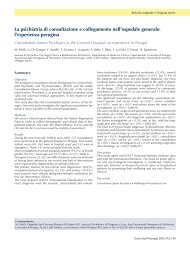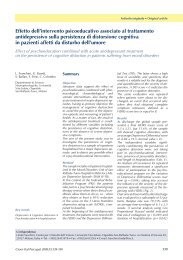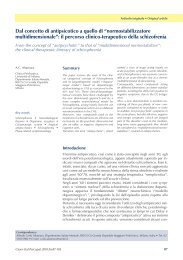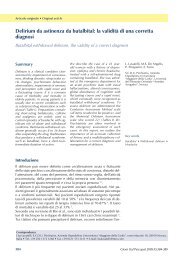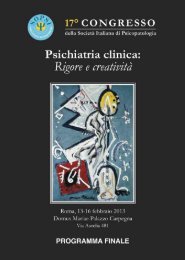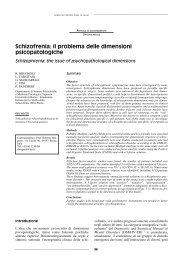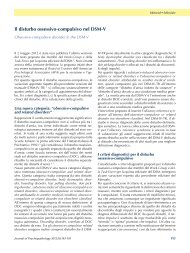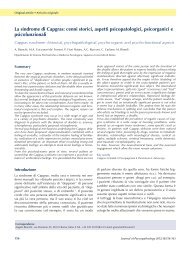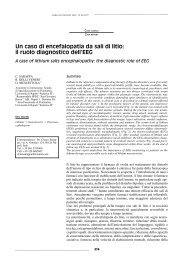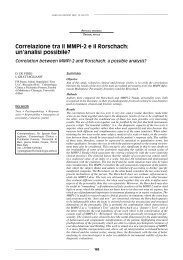XI Congresso della Società Italiana di Psicopatologia Psichiatria ...
XI Congresso della Società Italiana di Psicopatologia Psichiatria ...
XI Congresso della Società Italiana di Psicopatologia Psichiatria ...
Create successful ePaper yourself
Turn your PDF publications into a flip-book with our unique Google optimized e-Paper software.
suicidal, or had anxiety <strong>di</strong>sorders comorbi<strong>di</strong>ty, or had substance<br />
abuse <strong>di</strong>sorder, had a longer-lasting depression, more<br />
depressive episodes, more psychosocial impairment, and<br />
more personality <strong>di</strong>sorders.<br />
Nonqualifying depressed in<strong>di</strong>viduals were 80% of depressed<br />
outpatients. In bipolar depression, controlled trials<br />
showed opposite results. A systematic review and metaanalysis<br />
of controlled, short-term trials of antidepressants<br />
for bipolar depression (usually bipolar I depression) found<br />
antidepressants (often superimposed on mood stabilising<br />
agents) more effective than placebo, and antidepressants <strong>di</strong>d<br />
not induce more switching to mania than placebo (4% vs.<br />
5%).<br />
Instead, a selective review found short-term antidepressants<br />
effective only in a small proportion (15%), found long-term<br />
antidepressants use linked to a rapid cycling course in 25%,<br />
found that the current best evidence supported the use of<br />
lithium to treat bipolar depression, and also lamotrigine,<br />
possibly <strong>di</strong>valproex, and some atypical antipsychotics for<br />
acute and/or long-term management of bipolar depression.<br />
However, lamotrigine was found effective in the acute treatment<br />
of bipolar depression in one study, and not effective in<br />
two stu<strong>di</strong>es.<br />
Conclusion: controlled trials of antidepressants in nonbipolar<br />
depression are not representative of usual clinical practice.<br />
Controlled trials of antidepressants in bipolar depression<br />
have shown opposite results. Practical clinical trials,<br />
based on real-life populations, should become the new<br />
ground where to assess the efficacy of antidepressants for<br />
clinical practice.<br />
133<br />
SIMPOSI TEMATICI<br />
La politerapia psicofarmacologica negli<br />
stu<strong>di</strong> clinici controllati e nella pratica clinica<br />
G. Perugi<br />
Dipartimento <strong>di</strong> <strong>Psichiatria</strong>, Università <strong>di</strong> Pisa, Istituto <strong>di</strong><br />
Scienze del Comportamento “G. De Lisio”, Pisa<br />
Introduzione: nella pratica clinica il trattamento del Disturbo<br />
Bipolare richiede molto spesso l’impiego contemporaneo<br />
<strong>di</strong> <strong>di</strong>versi farmaci. La complessità e variabilità dello<br />
spettro sintomatico del Disturbo Bipolare ed i rapi<strong>di</strong> cambiamenti<br />
dei sintomi rendono generalmente in<strong>di</strong>cata la terapia<br />
con farmaci appartenenti a classi terapeutiche <strong>di</strong>verse.<br />
Metodo: rassegna <strong>della</strong> letteratura su Pub Med alle parole<br />
chiave Disturbo Bipolare polifarmacoterapia. Ricerca manuale<br />
<strong>di</strong> capitoli su libri o riviste non in<strong>di</strong>cizzate.<br />
Risultati: sali <strong>di</strong> litio, anticonvulsivanti, antidepressivi ed<br />
antipsicotici <strong>di</strong> 1° e 2° generazione, sono opzioni abituali<br />
nel trattamento del Disturbo Bipolare. Negli ultimi anni si è<br />
assistito ad un marcato incremento dell’uso delle associazioni<br />
farmacologiche nella pratica clinica a fronte <strong>di</strong> una<br />
mancanza pressoché assoluta <strong>di</strong> dati derivati da stu<strong>di</strong> controllati<br />
su <strong>di</strong> esse. Osservazioni naturalistiche, case reports e<br />
opinioni <strong>di</strong> esperti orientano le scelte dei clinici dal momento<br />
che gli stu<strong>di</strong> randomizzati e controllati in doppio cieco<br />
(RCT) sulle associazioni psicofarmacologiche sono rari.<br />
Conclusioni: dal momento che la polifarmacoterapia è la<br />
regola e non l’eccezione, i criteri <strong>di</strong> associazione delle molecole<br />
appartenenti a classi chimiche <strong>di</strong>verse devono essere<br />
attentamente considerati alla luce <strong>di</strong> fattori come efficacia<br />
dei <strong>di</strong>versi farmaci sulle varie componenti <strong>della</strong> sintomatologia,<br />
caratteristiche farmaco<strong>di</strong>namiche e farmacocinetiche,<br />
profilo <strong>di</strong> effetti collaterali, modalità <strong>di</strong> somministrazione e<br />
costi. Tra questi fattori il profilo <strong>di</strong> effetti collaterali dei farmaci<br />
cosomministrati è probabilmente quello più frequentemente<br />
utilizzato nella scelta <strong>della</strong> terapia.<br />
24 FEBBRAIO 2005 - ORE 14.15-15.45<br />
SALA CAVALIERI 2<br />
S56 - Fenomenologia e neuroscienze<br />
Presupposti per una neurofenomenologia<br />
S. Pallanti<br />
Istituto <strong>di</strong> Neuroscienze, Firenze<br />
Il termine Fenomenologia, impiegato da Lambert, nel 1764<br />
per definire la <strong>di</strong>sciplina che ha per oggetto lo stu<strong>di</strong>o <strong>della</strong><br />
parvenza, fu poi ridefinito da Kant nel 1770 spostando l’attenzione<br />
verso le categorie <strong>della</strong> modalità, più che sui contenuti.<br />
Questo approccio è <strong>di</strong>venuto centrale in psicopatologia grazie<br />
ai contributi <strong>di</strong> Jaspers, Binswanger, Mikowsky.<br />
Recentemente l’interesse per questo approccio all’incontro<br />
con il paziente, grazie anche ai contributi delle neuroscienze<br />
che hanno ridotto la fiducia nelle categorie <strong>di</strong>agnostiche,<br />
MODERATORI<br />
S. Pallanti, A. Rossi<br />
si è riacceso per la consapevolezza <strong>della</strong> necessità <strong>di</strong> approccio<br />
meno riduttivista alla sofferenza mentale.<br />
L’incontro tra Fenomenologia e Neuroscienze richiede comunque<br />
una riflessione che deve iniziare dalla definizione<br />
delle <strong>di</strong>scipline e dei meto<strong>di</strong><br />
Il termine “Neurosciences” viene ufficialmente impiegato<br />
da Francis O. Schmitt per definire il programma <strong>di</strong> ricerche<br />
da lui <strong>di</strong>retto al Massachusetts Institute of Technology MIT<br />
dal 1962 al 1974 e che aveva per oggetto lo stu<strong>di</strong>o del cervello<br />
e delle sue funzioni.<br />
Nella definizione del Neurosciences Research Foundation<br />
(NRF) il termine va ben oltre i campi <strong>della</strong> neurologia e la<br />
neurofisiologia poiché inter-<strong>di</strong>sciplinare sino dalla fondazione,<br />
Schmitt era un biologo molecolare microscopista<br />
elettronico, e per il suo ambizioso programma <strong>di</strong> ricerca si



